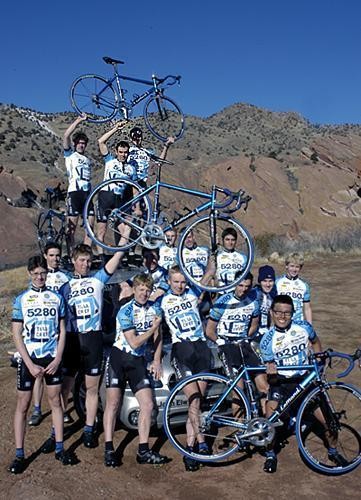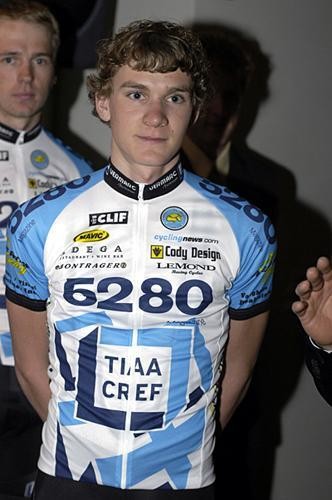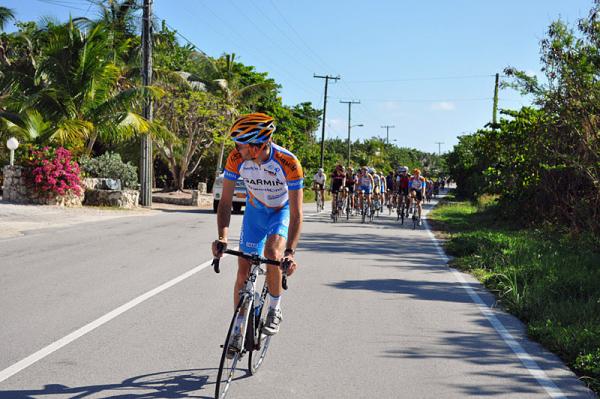To live and be alive
A day that will always remain with me



“We need an ambulance immediately for rider 54!” race radio blurted out unexpectedly after it had been droning out intermediate times for the last few hours. At first I didn’t really think about what they’d just said, nor did I realize the implication of this accidentally being said on a frequency normally reserved for race information. I was focused on the rider in front of me, and giving him the best instruction I could for this difficult time trial. However, after a minute or two it began to sink in.
I continued on to the finish behind my rider, but started to nervously make phone calls to see if anyone had information of why an ambulance was needed for number 54, Craig Lewis. No one seemed to know, until finally I was told to go to the Rome, GA hospital, as quickly as I could.
I arrived some 20 minutes after the call for an ambulance was heard. The hospital staff quickly recognized me as someone with the race and ushered me to the “quiet room” to meet with a doctor. Some minutes after, the doctor came in and asked me if I was family, I said no, but that I was Craig’s manager. He then solemnly looked at me and said “you need to get in touch with his family very quickly, as we are having trouble stabilizing Craig.”
That moment sticks with me like no other. I was going to have to make the call to Craig’s mother that she had spent the last 20 years praying she would never receive. It all came crashing in on me at that moment how terrified my own mother must have been, all those minutes after hearing I’d gone down in a race on TV, waiting to hear some news. How being taken to the emergency room as a rider, was just part of it, no big deal, you race bikes, you get hurt, whatever, next race. I never considered the fear and angst this put my own family through. I never considered that nasty crashes hurt anyone but the rider. But right then and there, it all came to me how hard this call would be.
“Mrs. Lewis, hello, this is Jonathan Vaughters your son’s team coach. Hi…… Mrs. Lewis, I’m afraid Craig has been in a very severe accident in the race, and you need to come to Georgia as soon as you possibly can………..”
I tried to reassure her that he was in good care and that I would call with any update, but the doctor made it clear that they were very unsure of where this situation was headed. I had put on a brave voice for her, but the fear in her voice is something I’ll never forget. The fear and pain of a mother knowing her son is hurt. “Please pray for him, Jonathan.” is the last thing she said before putting the phone down. I cried in a way I never have before or since when I hung up.
I was the one who brought Craig to this race. I was the one who’d coached him and pushed him. I was the one who put him into professional cycling, and I knew better. I knew how horrible and dangerous of a sport this was. I knew that the “fun and healthy” sport Craig’s parents thought he started in would turn cold and cut throat as he reached for the top. The speed would get faster, the roads would get smaller, and the peloton larger. Professional cycling has a way of dehumanizing everything at the top, and I knew that. I knew Craig’s competition would no longer regard the risk, but only the reward. I knew this wasn’t a sport any loving mother would want their son in. I had put Mrs. Lewis’ son in harm's way. I could not forgive myself.
Craig was just 19 at the time, a rising star in US cycling, and one with beautiful style on the bike, along with an confident flair that had me convinced he would go very far in the pro ranks. He came into that Tour of Georgia with absolutely no fear of the top pros. He’d beat them, pure and simple, was his attitude. And in the time trial that day, he was beating them again. His intermediate time had been announced as on par with Viatcheslav Ekimov at the halfway point, so he was on a great ride, without a doubt.
For Craig, sacrifice was the road to success. He had a determination and fire that I had not seen in the young riders I’d been working with since I retired. He had what it took to go far in this brutal and gladiatorial sport: He didn’t care about the consequences and I quietly loved his fierce pride.
That day in Rome I chose to let a neutral car drive behind Craig, while I went behind a more senior rider on the team. Craig’s persona was getting a bit large, so I figured he needed to know it wasn’t all about him. If you wanted to be a pro cyclist, you needed to be selfless, as well, and you needed to respect your boss. Letting him go on his own that day was a little message to him, and to the rest of the team: I don’t play favorites.
The regret I felt for that decision waiting in the “quiet room” was intense. As I heard the details of how a car had shot out into the road right after the police motorcycle that was leading him passed, I somehow thought that if I’d been the car following him, I could have done something to prevent it. Craig had slammed into the side of a car at 40mph on a fast descent. He never had time to even tap his brakes. The doctor said he was unconscious and had punctured both lungs, had massive internal bleeding, and had fractured dozens of bones, all of which were not known yet. These are the realities of when an unprotected human body is thrown to the ground in a way that only exists in our beautiful yet tragically primitive sport. It was not certain that he would live.
Some minutes passed, with no news, when a nurse came running in: “You need to come to the ICU, Mr Vaughters.” She would not be more specific, but I hurried along behind her with a knot in my throat bigger than my head. Craig was laying there, having just regained consciousness, bloody, tubes in his mouth, huge wounds everywhere, but he had written me a note that he was insistent on getting to me. It said in shaky and bloody writing “When can I ride again?”…….
I had no words. None. But the desperate look in his eyes really needed an answer. Again, I held back any real emotion I had and smiled. And lied. I told Craig “ don’t worry, this is just a small hiccup in your career. You’ll be back in no time.” This helpless, broken young man, in intense pain, fighting for his life had wanted to know one thing; when he could race again. I was awestruck and silent as I put on a strong “no big deal, kid” face that he wanted to see in his coach and mentor…Things seemed to start getting worse right then and the nurse pulled me from the room, as the doctors and other nurses moved quickly around the room as alarms went off, and instructions were shouted.
I called Craig’s mother once more, told her I spoke to him, and said her son was very strong. She seemed so serene and just asked me to pray for Craig, once again, and that they’d be there in a few hours.
Thankfully, Craig lived. At least his body did.
Months passed after the accident, and Craig had to endure two or three more surgeries, along with countless hours of rehab. Whenever I saw him, he was pale and feeble looking. The conquering giant I’d known earlier that year was gone, replaced by a depressed and sickly child. He seemed to distance himself from everyone, talking less about racing bikes, and more about the pain he was going through. While his body had lived, his spirit was gone. The impetuous fighter I knew was gone, his confidence washed away in a sea of reality. I felt helpless and I too distanced myself from him, as I was still running my little team. Seeing someone so hurt isn’t something pro cyclists like. They have to pretend that risk doesn’t exist. Being reminded of it only deflates their sense of invincibility. And without being invincible, in your mind, you will never succeed in professional cycling.
Silent months passed, when I got an email from him with no words, but an attachment. It was a photo of him on his trainer, all kitted out in his TIAA-CREF gear. He probably weighed 110 lbs and looked white as a ghost, but the pride he had from that first 10 minute ride was apparent in his grin peeking through his still wired shut jaw, like a tiny green bud poking through the ground in early spring. Small and fragile, but alive.
He soon asked me about doing a race…..When could he come back? Everything in me said to tell him to stop thinking about cycling and start thinking about just living a happy life. But every time I’d start down that path with him, I could tell, the one thing that would kill Craig would be if I told him he couldn’t live his dream. Every time I’d speak to his mother, I could tell her eyes would say to me: His soul will die if we don’t let him race again, but please be careful with my son. It’s a look I see every time I meet parents of any rider I work with, whether they are 16 years old or 35 years old. They can’t show that face to their son, as they know it will only damage their spirit, but they can show me that look. They can let me know how scared they are that their son has chosen such a rugged path.
Mid-summer, Craig came out to Colorado. He wanted a change of scenery after many months of being indoors. And he wanted to race. I drove behind him nervously, and against doctors orders, to a small training race south of Denver, and I watched him, still frail, ride in a peloton again. It would normally be a group he could fly past without a thought, but today he suffered and struggled just to keep up. He was scared on the bike, for the first time in his life, but just like before, his pride would never let that fear succeed.
While watching him sprint on the last lap, the goose bumps rose up on my skin. I saw he was alive again, for the first time in a long time.
Nothing else would have accomplished that. He needed to be a racer. I knew that he would one day be a proud and hardened member of the professional peloton. He was a warrior, and warriors need wars. For better or for worse.
The latest race content, interviews, features, reviews and expert buying guides, direct to your inbox!